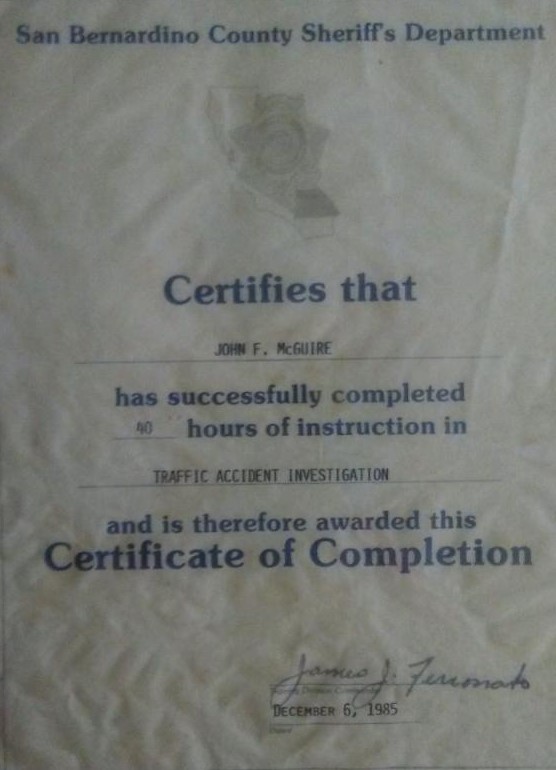 Fatal car crash investigations are complex and include many facets depending upon the circumstances of the crash. As a former military police officer who holds a special certification as a trained traffic accident investigator specialist from the San Bernardino County Sheriff’s Academy, I am fully aware of fatal crash accident investigation procedures. This training affords me a huge advantage as a fatal car accident attorney when I’m representing family members whose loved one was lost in a fatal crash.
Fatal car crash investigations are complex and include many facets depending upon the circumstances of the crash. As a former military police officer who holds a special certification as a trained traffic accident investigator specialist from the San Bernardino County Sheriff’s Academy, I am fully aware of fatal crash accident investigation procedures. This training affords me a huge advantage as a fatal car accident attorney when I’m representing family members whose loved one was lost in a fatal crash.
Over the years, people have asked me what is involved in a police investigation of a deadly car crash. While circumstances dictate differences in handling each fatality, there are some general principles that every investigation includes.
Once a police officer is dispatched to the scene of a fatal car crash, the officer observes the accident scene and speaks with emergency personnel (if they have already arrived) to determine the extent and severity of the injuries. The officer will speak with any witnesses at the scene and, if possible, the drivers or passengers in the vehicles involved. Roadway evidence is noted, preserved, and recorded for further investigation. At the site, measurements are taken of evidence left by the vehicles such as point of impact, final resting positions, skid marks, scrub marks, and gouge marks. These measurements are usually taken using electronic surveying equipment. With this equipment, a computer-generated scale diagram can be produced and may be used to reconstruct the accident.
Vehicle inspections are another typical part of the accident investigation. These inspections will usually include measuring the amount of damage and damage profile of the vehicles. This information will be useful if an accident reconstruction is performed. The mechanical components of the vehicles such as brakes, steering, tires, suspension, lights, etc. may also be inspected and tested to determine if the condition of these components was a causative factor in the accident.
The police will investigate an accident to determine if any criminal behavior was involved. Some of the things the police look for are speeding, hours-of-service violations, mechanical violations, alcohol use, drug use, etc. For example, if a truck driver is exceeding his hours of service and causes a serious accident because he fell asleep at the wheel, he will likely be criminally charged. If that accident results in a fatality, the charge will likely be homicide.
In fatalities, a Florida Traffic Crash Report, Long Form must be completed and submitted to the department within 10 days after an investigation is completed by the law enforcement officer.
The Florida Traffic Crash Report, Long Form must include:
- The date, time, and location of the crash.
- A description of the vehicles involved.
- The names and addresses of the parties involved, including all drivers and passengers, and the identification of the vehicle in which each was a driver or a passenger.
- The names and addresses of witnesses.
- The name, badge number, and law enforcement agency of the officer investigating the crash.
- The names of the insurance companies for the respective parties involved in the crash.
In addition to the FTCR, fatal crash investigations will include toxicology tests on the drivers involved.
Since there are many types of accidents such as head-on, rear-end, left turn, etc., reconstruction methodologies will differ to fit the type of accident being investigated.
The Florida Department of Transportation gathers these crash reports and is able to analyze trends in fatal car crashes in Florida. One such study found that 75% of persons involved in fatal crashes were male. You can read the entire study (I warn you, it’s long!) can be found here.
As you can tell, fatal car accident investigations are complex and include many factors. If a loved one has been involved in a fatality on the roadway, make sure you hire an attorney that is a certified traffic accident investigator. Such an attorney will understand the voluminous reports and be able to determine if anything was missed.
